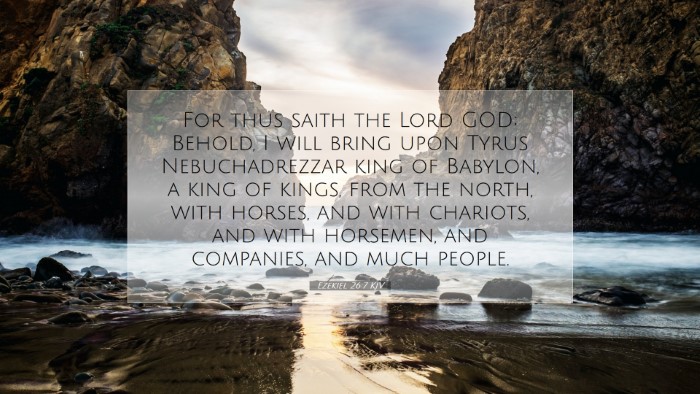Ezekiel 26:7 Commentary
Verse Reference: Ezekiel 26:7 - "For thus saith the Lord God; Behold, I will bring upon Tyre Nebuchadrezzar king of Babylon, a king of kings, from the north, with horses, and with chariots, and with horsemen, and companies, and much people."
Introduction
The prophecy against Tyre marks a significant moment in Ezekiel's ministry, showcasing the sovereignty of God in orchestrating the downfall of nations. Tyre, a Phoenician city known for its wealth and influence, faced divine judgment through Nebuchadnezzar's impending siege. This verse, combined with insights from public domain commentaries, reveals the theological implications of God's judgment as well as practical teachings for contemporary believers.
The Historical Context
Ezekiel prophesied during a time of upheaval for Israel and the surrounding nations. The historical backdrop involves not only the Babylonian exile but also the geopolitical turmoil of the ancient Near East. Tyre was a powerful city-state, rich in commerce and strategically located along the Mediterranean coast. Understanding this context is vital to grasp the weight of God's word through Ezekiel.
Insights from Matthew Henry
Matthew Henry highlights that this prophecy serves as a solemn warning regarding the consequences of pride and rebellion against God. He notes that Tyre's reliance on its wealth and alliances has led to a false sense of security. Henry emphasizes God's ultimate control over earthly powers, symbolized by the rise of Nebuchadnezzar:
- Divine Sovereignty: The text reflects that God is orchestrating Nebuchadnezzar's actions, emphasizing His authority over all nations.
- Judgment Against Pride: Tyre's downfall serves as a lesson against the arrogance of those who trust in material wealth and fortifications rather than in God.
Insights from Albert Barnes
Albert Barnes comments on the prophetic nature of this verse, noting the specificity of Nebuchadnezzar as the instrument of God's judgment. He notes:
- Historical Fulfillment: Nebuchadnezzar did indeed attack and lay siege to Tyre, fulfilling this prophecy over a period of years.
- Symbolism of Horses and Chariots: The description of Nebuchadnezzar's military forces suggests an overwhelming and formidable challenge to Tyre's defenses, serving as a metaphor for God's overwhelming judgment against sin.
Insights from Adam Clarke
Adam Clarke’s exposition offers a detailed analysis of the text regarding the characteristics of God's chosen agent of punishment:
- Characteristics of Nebuchadnezzar: Clarke points out that Nebuchadnezzar is described not just as a king but as "a king of kings," which signifies his power and reach in the ancient world.
- Sign of Hope for God's People: Clarke also notes that the prophecy against Tyre is a hope for the Israelites, indicating that God has not forgotten His people and will act against their oppressors.
Theological Implications
Several critical theological themes emerge from Ezekiel 26:7:
- Sovereignty of God: This verse affirms God’s control over history and His ability to use nations and rulers to accomplish His divine will.
- God’s Justice: The passage illustrates God's righteous judgment on nations and the destructive power of sin, underscoring God’s holiness.
- Hope in Judgment: For the faithful remnant, the destruction of their oppressor symbolizes eventual restoration and deliverance.
Practical Applications
This prophecy can serve several practical applications for contemporary believer:
- Trust in God’s Plan: Believers are encouraged to trust that God will bring justice in His time and in His way, even when circumstances seem dire.
- Avoiding Complacency: Just as Tyre's wealth led to complacency, Christians are warned against reliance on worldly resources rather than spiritual truths.
- God’s Faithfulness: Understanding that God cares for His people and acts on their behalf—often in unexpected ways—is vital for developing faith and perseverance.
Conclusion
Ezekiel 26:7 serves as both a historical account and a profound theological statement about God’s sovereignty and justice. The insights from respected commentators deepen our understanding of the text, reminding us of the critical importance of humility and reliance upon God. As pastors, students, theologians, and scholars engage with this passage, they are challenged to reflect on God’s nature and the ramifications of pride, ultimately finding solace in the knowledge of God’s overarching plan in history.


